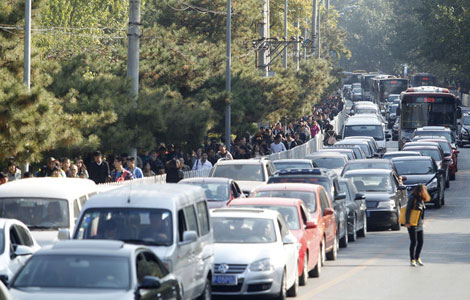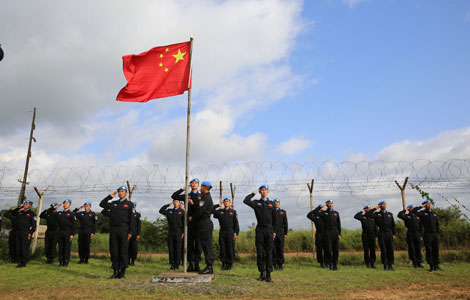

A drastic "mutual distrust" against each nation's defense policy is fueling the deadlock in China-Japan relations, a senior expert said.
Zhang Tuosheng, director of the research department at the China Foundation for International and Strategic Studies, said the two neighbors are questioning each other's expanding military strength at a time when the overall relationship is being haunted by historical and territorial issues.
"In regard to China's defense policies, Japanese politicians and leading media have labeled China as a major threat to navigational freedom and the regional situation.
"Yet in the meantime, many scholars and opinion leaders in China expressed concerns that Japan is shifting toward militarism," Zhang said.
Public diplomacy between the two peoples is expected to embark on the defense issue to "make necessary explanations to dispel concerns", he said.
Tensions between the world's second and third largest economies flared up after the Japanese government unilaterally announced the decision to "nationalize" part of China's Diaoyu Islands in the East China Sea last September.
Government vessels from China have increased patrols around the islands ever since. In the past year, the Japanese Self-Defense Forces also scrambled fighter jets to conduct reconnaissance to an unprecedented level.
Tokyo took the initiative to break the status quo and Beijing resorted to countermeasures. "It is probable" that there will be a long-term struggle regarding the islands, Zhang said.
Top spokesmen of the Japanese government have repeatedly denied the existence of the dispute while the Chinese Foreign Ministry also called for Japan to face up to history and reality.
"It is unlikely to achieve a complete settlement of the islands issue in the mid- and long-term because the two governments will hardly make any major concessions," Zhang predicted.
As the two largest economies in Asia, it is time for both China and Japan to consider an impending question — how to get along with each other when few signs of hope are shown regarding the territorial issue, Zhang said.
Both sides are expected to put a crisis management mechanism into use. "After all, neither side expects to see a major conflict or even a war taking place in the waters off the Diaoyu Islands," he said.
"Tokyo and Beijing should make sure efforts are in place to keep the situation under control simultaneously when the gaming goes on," he added.
On the economic front, the two interdependent neighbors have suffered great losses from the ongoing strains.
"An enduring deadlock in both the political and economic fields will end up in a complete lose-lose situation," he said.







